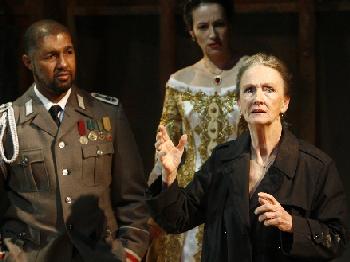SITE GUIDE
SEARCH
REVIEWS
FEATURES
NEWS
Etcetera and
Short Term Listings
LISTINGS
Broadway
Off-Broadway
NYC Restaurants
BOOKS and CDs
OTHER PLACES
Berkshires
London
California
New Jersey
DC
Philadelphia
Elsewhere
QUOTES
TKTS
PLAYWRIGHTS' ALBUMS
LETTERS TO EDITOR
FILM
LINKS
MISCELLANEOUS
Free Updates
Masthead
Writing for Us
A CurtainUp Review
A Hard Heart
By Les Gutman
|
Who stoops to smear their saviour with her faults? ---Riddler |

D. Graham, M. Friedman and K. Chalfant
(Photo: Carol Rosegg) |
Somewhere within Howard Barker's A Hard Heart lies a cautionary tale. The question is not so much how deep one must dig to uncover it, but what one has found when it is in hand.
Barker is a British playwright of the last quarter or so of the 20th Century. His work, which is at once politically and psychologically based, is infrequenty produced in the US, and not that much more frequently produced in the UK. (A company devoted exclusively to presenting his plays, The Wrestling Company, recently closed up shop.) Barker calls his work "The Theatre of Catastrophe," which his bio in the playbill explains to mean that "no attempt is made to satisfy any demand for clarity or the deceptive simplicity of a single 'message.'" Well, OK, then. . .
Barker sets A Hard Heart in a mythical kingdom that conjures up classicism by means of some Hellenic nomenclature, but is clearly tethered to the just-ended era of Margaret Thatcher. (The play was first produced in 1992.) The "Iron Lady" is now denominated Riddler (Kathleen Chalfant) and aptly described by the play title. A "woman of originality," Riddler has been engaged by the local queen (Melissa Friedman) to devise a plan to rebuff the barbarians at the gate. There is also a general (Dion Graham), who says "yes" to just about everything, and a competing genius, who is also the local crazy person, and who has been given the none-too-subtle name, Seemore (Thom Sesma).
Though Epic Theatre Ensemble sells "A Hard Heart" for its seemingly "prophetic" qualities ("long before 9/11, the Patriot Act, the new Pope and the current immigation debate"), Barker's play is not nearly so "deceptively simple". His front story, it turns out, is mere window dressing for the back story wherein, rife with Oedipal possibilities if not probabilities, Riddler has a son (James Wallert) who will figure prominently in all that transpires. (That son will also serve to further root the play in its period; his name is Attila, and you may recall that when the British tabloids got tired of calling Margaret Thatcher "The Iron Lady," they called her "Attila the Hen".) The two stories coalesce in a miasma that makes the whole effort unworthwhile.
This play demonstrates why Barker's ornate writing and punishing dramaturgy is seldom produced: it's as dense as a privet hedge. Will Pomerantz directs it with more devotion to the avoidance of clarity than one might hope for. After a period of indulgence, the play becomes wearisome, feeling like a dexterity contest in which the language has been pitted against the acting.
Notwithstanding, the acting is not at fault here. Ms. Chalfant is always fun to see onstage, and her scenes with Mssrs. Sesma and Wallert are at least engaging in strange ways. Both of them are also quite fine in their own right. While Narelle Sissons wooden contraption of a set is likely firmly rooted in Howard Barker's aesthetic, it nonetheless struck me as more in the way of, than in support of, the piece. Chris Rumery's costumes seemed right in all cases except the queen, and Lenore Doxsee's moody-ish lighting fit well to the set, caveats noted above. Finally, Mark Huang's abundant sound design kept things rattling and rolling quite well, though I was often unsure why.
If the point of all this is to say that statescraft is sometimes, or usually, or always, driven by some sort of psychopathology, well sure, why not? But I can think of any number of less grueling ways to make the point.
| A Hard Heart by Howard Barker Directed by Will Pomerantz with Kathleen Chalfant, Melissa Friedman, Dion Graham, Alex Organ, Thom Sesma, James Wallert and Sarah Winkler Set Design: Narelle Sissons Costume Design: Chris Rumery Lighting Design: Lenore Doxsee Sound Design: Mark Huang Running Time: 1 hour and 40 minutes with no intermission A production of Epic Theatre Ensemble Clurman Theatre, 410 West 42nd Street (9/10 Avs) Telephone (212) 279-4200 Opening November 11, 2007, closes December 9, 2007 Tues @7, Fri-Sat @8 plus various other times; $50 Reviewed by Les Gutman based on 11/8/07 performance |
Try onlineseats.com for great seats to
Wicked
Jersey Boys
The Little Mermaid
Lion King
Shrek The Musical

The Playbill Broadway YearBook

Leonard Maltin's 2007 Movie Guide


Wicked
Jersey Boys
The Little Mermaid
Lion King
Shrek The Musical

The Playbill Broadway YearBook

Leonard Maltin's 2007 Movie Guide


